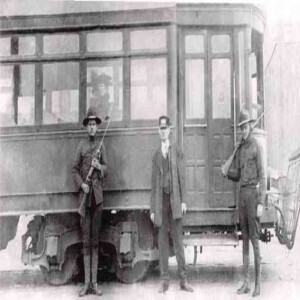
https://feed.podbean.com/laborhistoryin2/feed.xml
A daily, pocket-sized history of America's working people, brought to you by The Rick Smith Show team.
Sunday Feb 14, 2021
On this day in labor history, the year was 1918.
That was the day 300 commercial laundresses in Kansas City walked off the job, demanding a union.
Male laundry delivery drivers successfully organized the previous summer.
They soon joined the women on the picket lines.
The Employers’ Association had financed an open-shop drive since the beginning of the war.
The laundry companies refused to grant wage increases to the drivers.
They also refused to acknowledge the women’s demand for a union.
The Women’s Trade Union League tried to hold hearings about the strike at the Hotel Muehlebach.
But the Hotel refused to allow striking black workers into the building.
As a result, their white coworkers refused to testify.
When the hearings were finally moved, the women told of intolerable conditions.
Laundresses complained of filthy workplaces and potential firetraps.
They reported that laundry owners had put together their own private police force.
These guns for hire assaulted women strikers, breaking one’s arm, another’s wrist and injuring many more in hopes of deterring them from pressing on with their demands.
In the 6th week of the strike, 25,000 more workers of Kansas City called a general strike.
According to historian Maurine Weiner Greenwald, “they supported the laundry workers’ demands for increased wages, union recognition and enforcement of state regulations regarding hours and working conditions.”
Greenwald notes the general strike was relatively peaceful until the Kansas City Railway attempted to run streetcars with scab labor.
Finally, the laundry companies agreed to union recognition and later promised wage increases.
They soon reneged. But the show of solidarity among workers provided key lessons for future labor struggles in Kansas City.
More Episodes
 2024-09-10
2024-09-10
 2024-09-09
2024-09-09
 2024-09-07
2024-09-07
 2024-09-06
2024-09-06
 2024-09-06
2024-09-06
 2024-09-05
2024-09-05
 2024-08-30
2024-08-30
 2024-08-28
2024-08-28
 2024-08-27
2024-08-27
 2024-08-26
2024-08-26
 2024-08-25
2024-08-25
Create your
podcast in
minutes
- Full-featured podcast site
- Unlimited storage and bandwidth
- Comprehensive podcast stats
- Distribute to Apple Podcasts, Spotify, and more
- Make money with your podcast
It is Free
- Privacy Policy
- Cookie Policy
- Terms of Use
- Consent Preferences
- Copyright © 2015-2024 Podbean.com




